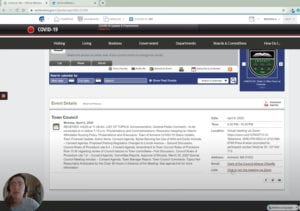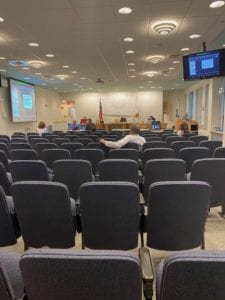Who is a member?
Our members are the local governments of Massachusetts and their elected and appointed leadership.

Amherst Communications Manager and Community Participation Officer Brianna Sunryd conducts a training on Town Council Zoom meetings.
As COVID-19 gripped Massachusetts late last spring and Amherst officials began making decisions to cancel summer camps and sports activities, Town Manager Paul Bockelman said municipal recreation staff would likely be reassigned to other duties. A few months later, some are undertaking tasks far removed from engaging children through sports and craft projects.
While idled staff might be likely candidates for layoffs in times of tight budgets, Amherst recreation staffers are instead working alongside colleagues in IT, learning technical skills needed to run virtual Town Council meetings. It’s an arrangement that keeps them productively employed and adds to the cadre of trained staff Amherst needs to run the 45 to 50 hours of meetings the town now conducts via the online platform Zoom each week.
“That department, because of declines in programming and enrollment, may have seen some layoffs,” said Amherst Communications Manager and Community Participation Officer Brianna Sunryd. “Why not take these team members already onboard and develop them to take on IT roles?”
She added that about a dozen additional town employees have taken on new Zoom responsibilities in their home departments during the pandemic.
As municipalities across Massachusetts moved meetings online last spring, a worrisome reality quickly set in. The territory was not only unfamiliar, but it relied on technology vulnerable to mischief by a new brand of vandals. “Zoombombing” is among several words coined during the pandemic, and municipal meetings in Leominster, Milford and Salem have been among the victims.
“We had a couple of early incidences that were only visible to internal staff,” Sunryd said. “Because of our awareness of Zoombombing, we had set up most of our security protocols in test environments prior to going live, luckily.”
Sunryd, who has a background in IT, and the town’s IT Department conducted about 15 group and one-on-one training sessions in security issues and other best practices with key town staff – people who became “power users of Zoom” in various departments. The town broadened the reach of this training by recording and sharing it throughout municipal government and developing “quick reference guides” that include user tips and Zoom platform updates, Sunryd said.
“We had some folks who had never used the technology at all and some who were very fluent,” she said, adding that all “have really risen to the occasion.”
Managing the Zoom boom

Essential staff safely gathered to monitor and coordinate remote Town Meeting in Brookline.
There appears to be something of a statewide trend to rely on non-IT staff to take on Zoom support roles. Brookline Deputy Town Administrator Melissa Goff said the Select Board there “flipped to the virtual world pretty quickly after the governor made his executive order that allowed us to have remote meetings.”
“We had some board members who were good at it and some board members who had never done it before,” she said, adding that, with weekly Select Board meetings routinely lasting five or six hours, “being able to provide the public engagement that citizens are expecting has been important.”
Goff cited Administrative Services Director Devon Williams’ willingness to dive into a new role as “the main way we have been able to continue these meetings.” Previously, Williams would support the Select Board with agenda-setting and other administrative duties. “Now, she is in the thick of the meetings,” and thus far has managed to keep the Select Board Zoombomb-free.
Like other municipalities, Brookline adopted the webinar version of Zoom early on for enhanced security. In addition, the town’s IT Department trained staff in various departments in aspects such as setting up secure Zoom meetings and managing possible problems.
In Medfield, senior officials such as the town administrator, assistant town administrator and town planner are wearing new hats as Zoom support staff.
Pre-pandemic, “the town planner would never attend the [Conservation Commission] meetings,” said Medfield Town Administrator Kristine Trierweiler. “Now, she sets up the Zooms, posts the meetings, and stays on in case there are any technical issues.”
With sometimes more than three Zoom meetings scheduled the same evening, Trierweiler foresees a potential need for more help.
Acton Town Manager John Mangiaratti said the number of meetings each night compelled his town to go a different route. After the town moved to Zoom in the spring, Mangiaratti said IT Department staff were soon working 12-hour days between supporting an entirely remote workforce by day and staffing two to three meetings for Acton’s nearly 40 boards and committees each night. The town decided to use federal Coronavirus Relief Fund funding to hire someone dedicated to Zoom.
“This virtual meeting organizer helped take the burden off our IT staff, and it really opened up access to public participation,” said Mangiaratti, adding that, while CARES Act funding ends Dec. 30, “we’re evaluating options of how we may be able to continue that resource into the spring.”
Tapping outside help is a strategy elsewhere, as well. Boston University’s IT Department, for example, volunteered to assist with Brookline’s six-session, 250-member Town Meeting on Zoom in June.
The town of Nantucket used an “additional services” clause in its public access TV contract to provide technical setup and staffing of Zoom meetings for 10 permit-granting and regulatory boards. Nantucket Operations Administrator Erika Mooney said the town has an additional 20 non-regulatory bodies, and she manages calendars and schedules Zoom for all 30 (six to seven meetings per day). Mooney also provides one-on-one Zoom training for those who need it. It’s a new role on top of her pre-pandemic work, and one she’ll likely keep for a while.
“I know there are a lot of people who are anxious to meet in person again,” she said. “They aren’t comfortable with the technology, or they miss the in-person meetings. But I don’t see us stopping the Zoom meetings any time soon.
Nantucket has meetings booked on Zoom through next June.
Written by Lisa Capone